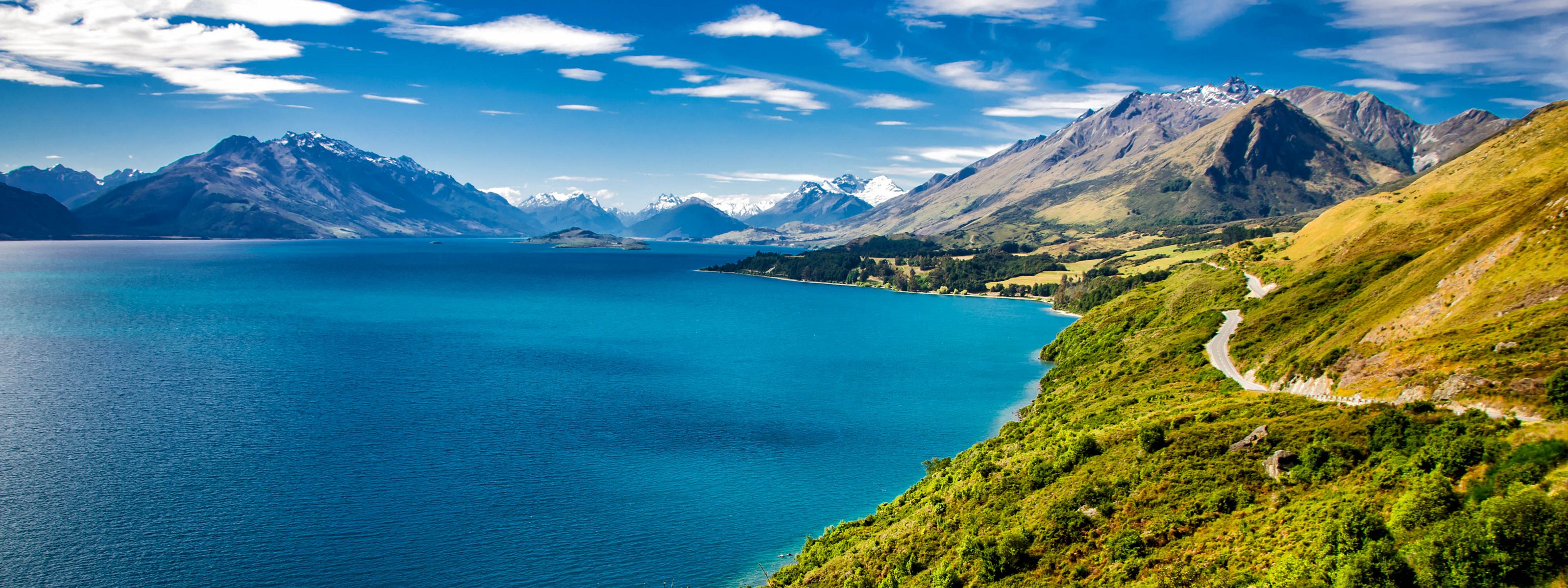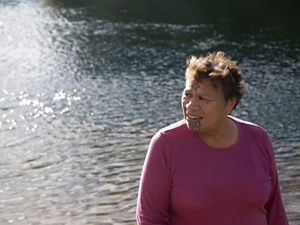Nature's Leading Women
The Nature Conservancy Aotearoa New Zealand participates in a transformative gathering around reconnecting, learning from and inspiring women.
By Arpége Taratoa (Ngāi-te-Rangi, Ngāti Ranginui, Ngāti Raukawa, Ngāpuhi, Ngāti Rārua)
In December 2024, a group of wāhine (women) from Aotearoa, travelled to Australia to join other women from around the world at The Nature Conservancy’s ‘Nature’s Leading Women’ (NLW 2024) gathering. The event was designed as a learning exchange for women leaders in climate and conservation work, including TNC staff and Indigenous women working at a grassroots level across Australia, Aotearoa, Solomon Islands, Papua New Guinea, Kenya, Tanzania, Indonesia and Micronesia. Representing Aotearoa, Debs Martin, Aneika Young, Renee Love, Kura Stafford and Sacha Healey reflected on their experience, and on personal and professional insights they have gained.
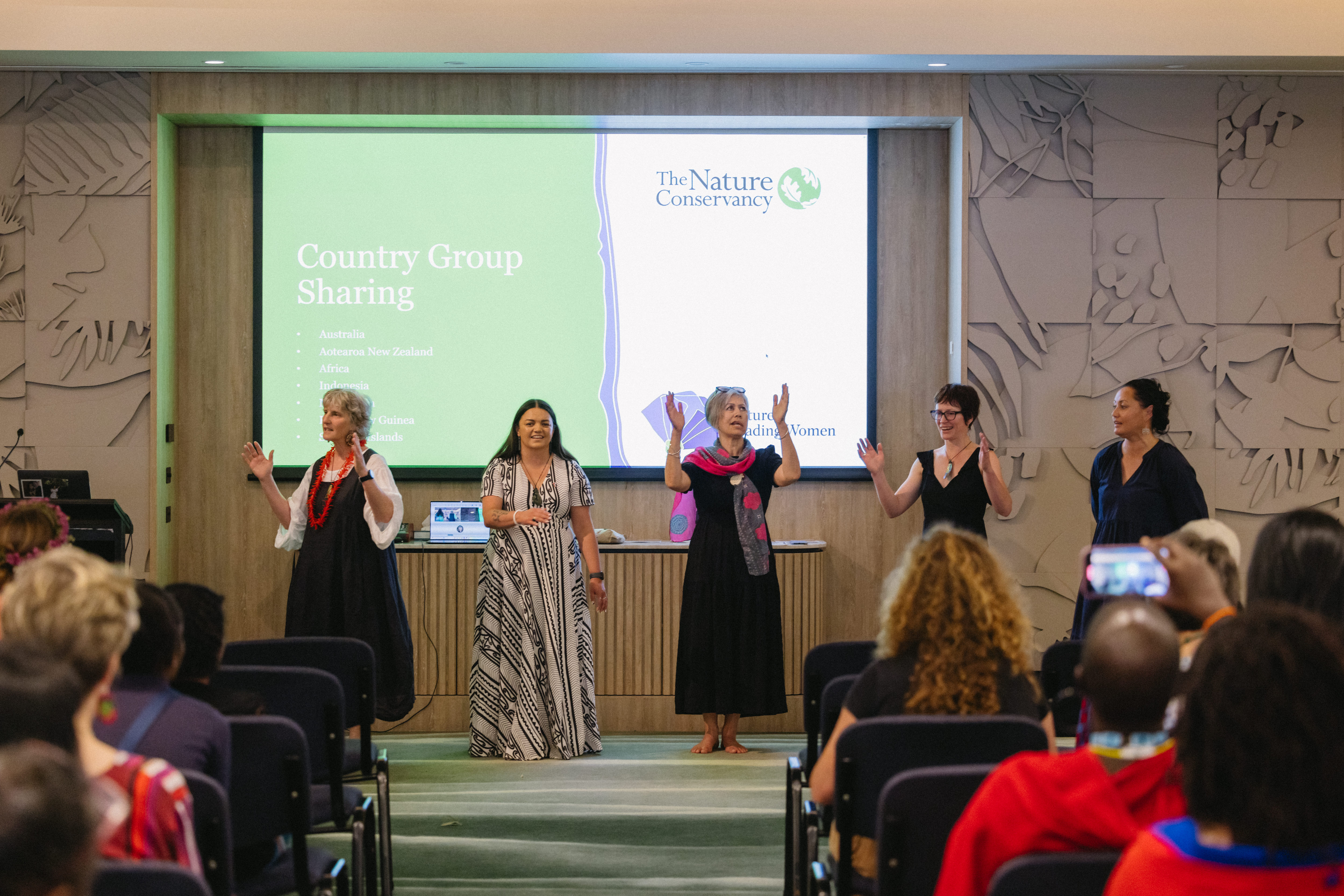
Debs Martin
Kotahitanga mō te Taiao Alliance (KMTT) Programme Manager, Debs Martin, found the gathering an affirming and deeply personal experience of reconnecting with her Pacific roots and reinforcing the importance of spaces where people can share their histories and identities. The weaving circle, where women exchanged traditions and stories, reminded her of the need for culturally authentic gatherings in conservation work. This gathering, unlike many conferences, was not just intellectual. It embodied storytelling, connection and collaboration - elements she felt are often neglected in the professional sphere.
In her words . . .
Attending NLW 2024 was an affirming and empowering experience. So often, conferences operate at a purely intellectual level, but this gathering felt deeply integrated. It was a space where I not only learned but also reconnected with a more holistic approach to collaboration.
One of the most profound moments for me was sitting in a weaving circle, surrounded by incredible women, sharing stories, traditions and wisdom. It reminded me of the way in which women work: collectively and at the same level. Listening and working at the same time.
My father’s family are from Rarotonga and my mother’s side is English, however, I was adopted at birth. Growing up in the South Island, it wasn’t common to be surrounded by Pacific cultures, yet my mother created a home where that was our norm. We often had people from the Solomon Islands and Tonga in our home, sharing meals, stories and traditions.
As I sat in that weaving circle, I had a strong sense of familiarity—this was the same sense of connection I was taught to carry through my life. It reminded me how important it is to create spaces that feel authentic, where we can connect to our histories and identities.
The NLW gathering was designed in a way that was true to the people in the room. It wasn’t just structured around a Western, colonised framework; it allowed for organic conversations, storytelling and connection. Down the back of the room, we had an open space where we could sit, kōrero (talk), weave and share experiences. I had a photo from my christening, showing me being held by someone from the Solomon Islands. When I shared it with the women from the Solomon Islands, they immediately knew where they came from and could tell me their place in the community. That moment reinforced the deep importance of knowing where we come from and how our histories shape who we are today.
One of the most impactful discussions I had was around the idea of “nothing about us, without us.” It’s a phrase I’ve heard echoed in political discussions, particularly in relation to the Treaty of Waitangi principles, and it resonated deeply in this context. Whether we’re talking about conservation, climate work or working within communities, the people affected must be at the center of decision-making, from the local level and throughout all levels of decision making that impact the natural world. Whether it is a government or NGO, women’s stories need to be centred in the context. NLW 2024 reinforced that commitment within The Nature Conservancy - ensuring that we are not just making decisions for communities but with them.
Another key realisation for me was how rare it is for women in conservation to come together in this way. It’s something we don’t do often in our network at home, but when we create these spaces, we open the door for deeper collaboration and a stronger sense of collective purpose. This highlighted how important it is to create spaces specifically for women in this field, especially when working across different cultural contexts.
I also gained a deeper appreciation for the way women lead and communicate. We often sit low to the ground, speak in circles, and build relationships and a deeper understanding of the collective considerations before making decisions. This experience gave me a renewed sense of direction for how I want to approach leadership and change in my own work.
Quote: Debs Martin
When I came home, I felt energised. This wasn’t just another conference—it was a transformative experience that reinforced the importance of connection, culture and collaboration. It gave me new pathways to bring these insights into my work, and for that, I am deeply grateful.
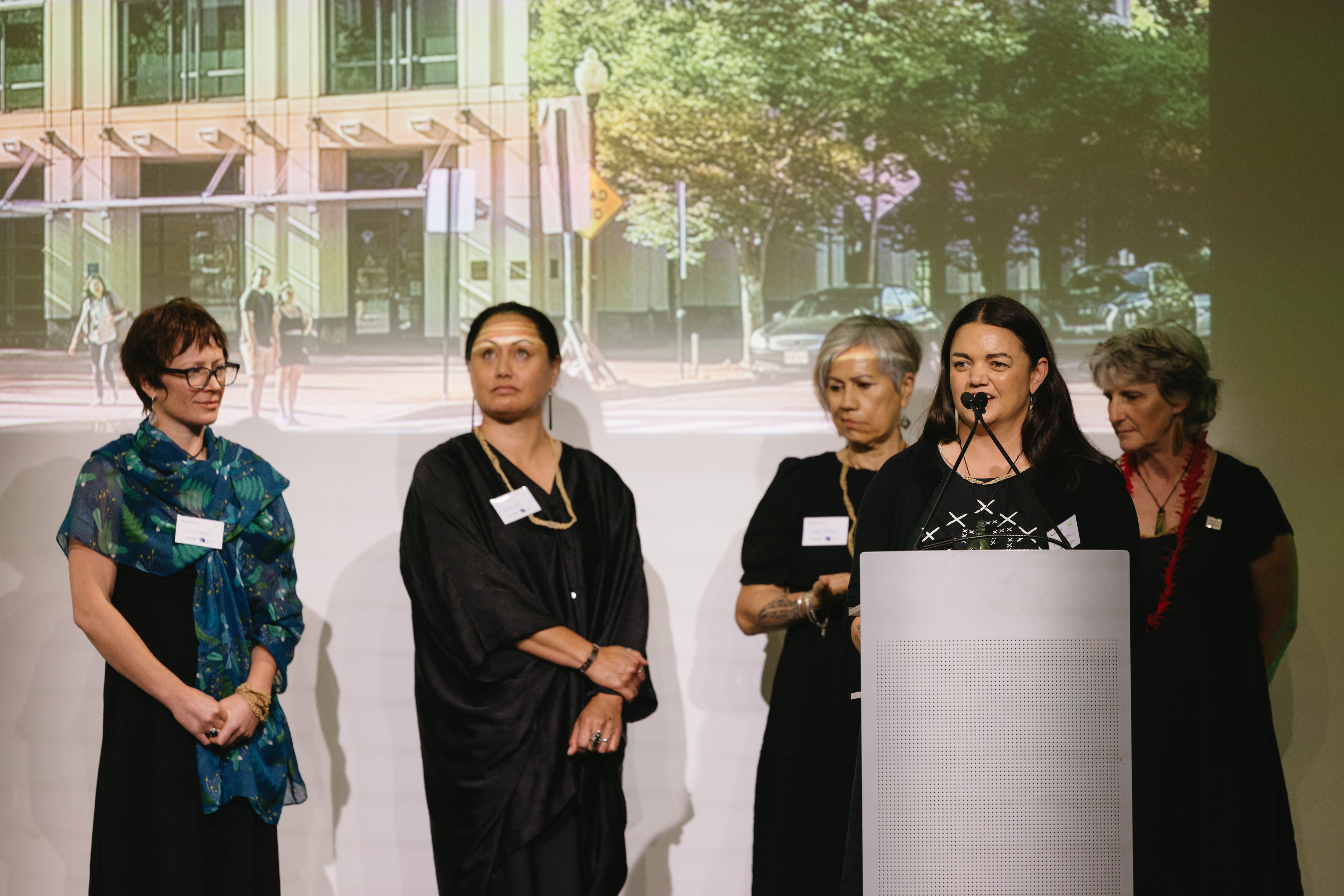
Aneika Young
For Aneika Young, Poutohutohu Ao Māori Advisor (Guide to the Māori world) for the Kotahitanga mō te Taiao Alliance (KMTT) and TNC NZ, the gathering provided a powerful lens into how Indigenous conservation efforts differ yet share common values across cultures. She reflected on the importance of holding space for Indigenous voices, not just including them in conversations but ensuring they lead. Witnessing the presentation of Solomon Islands women’s visual work emphasised the power of representation and self-determined storytelling. The experience also made her consider the balance between support and empowerment—how indigenous women can be uplifted without being overshadowed.
In her words . . .
A big part of my work is about restoring and protecting our natural environment while keeping tikanga (customs) and mātauranga Māori (Māori knowledge) at the forefront. Seeing the way other Indigenous women approach conservation in their own spaces was really eye-opening—there’s so much we have in common, but also so much to learn from each other. It was powerful to be in a space where everyone had a shared understanding of what it means to be Indigenous in their own worlds, but also seeing the differences in how we navigate these spaces.
The 'Welcome to Country' ceremony was beautiful and a very important part of grounding us all culturally in the place. It would be great in future years to have the local people leading and woven into the whole program beyond that so we can get an understanding of the cultural landscape and visit the places that are important to the home people where we are visiting. That’s something I think can make the experience even richer.
One of the most incredible moments was seeing the Solomon Island women presenting their visual work at the gallery. They had a panel and a proper presentation, and it was really special. My instinct was to get up and karanga (a ceremonial call) to acknowledge them, but I had to remind myself that we weren’t in a Māori space. There was a Māori guy there as part of another exhibition, and he said to me, “Just because you can doesn’t mean you should.” And I thought, yeah, that’s true—it’s all about context, the reality of Indigenous culture looks different everywhere.
When we were doing restoration planting, it was really hands-on, and you could see how different cultures approach kaitiakitanga (guardianship). Some of the women had never done anything like that before, and for others, it was just second nature. It made me think about how important it is to create spaces where we can pass that knowledge on—especially for those who might not have had access to it growing up.
There were moments where I was really mindful of how space was being held, especially for those who don’t speak English or find western culture overwhelming. Being in this environment must have been a lot. Many of these women wouldn’t have been able to be there without support, and that’s so important. But it also made me think—how do we make sure that Indigenous voices are at the center, not just present? I suppose there’s a balance in making sure people feel supported while also lifting them up to take that space.
NLW 2024 was an amazing experience—so many Indigenous women coming together, sharing knowledge, and connecting across cultures. We were invited to be co-authors on a paper about the experience, and I thought, it really should be an Indigenous woman writing this. I don’t want to just be a co-author - it’s about real leadership. It reminded me of that development argument, where the intention is to help, but sometimes that means others are still leading the way instead of those with lived experience. If we bring it home to Aotearoa, we’ll make sure Indigenous women aren’t just included, but leading. Because when we lead, the whole kaupapa (discussion) shifts.
Quote: Aneika Young
It was incredible to be part of this. The fact that it even exists is huge. Of course, there’s always room to grow, but the intention behind it was so strong. The biggest thing we all took away was, what’s next? How do we use these connections to make change? It doesn’t feel like it's over.
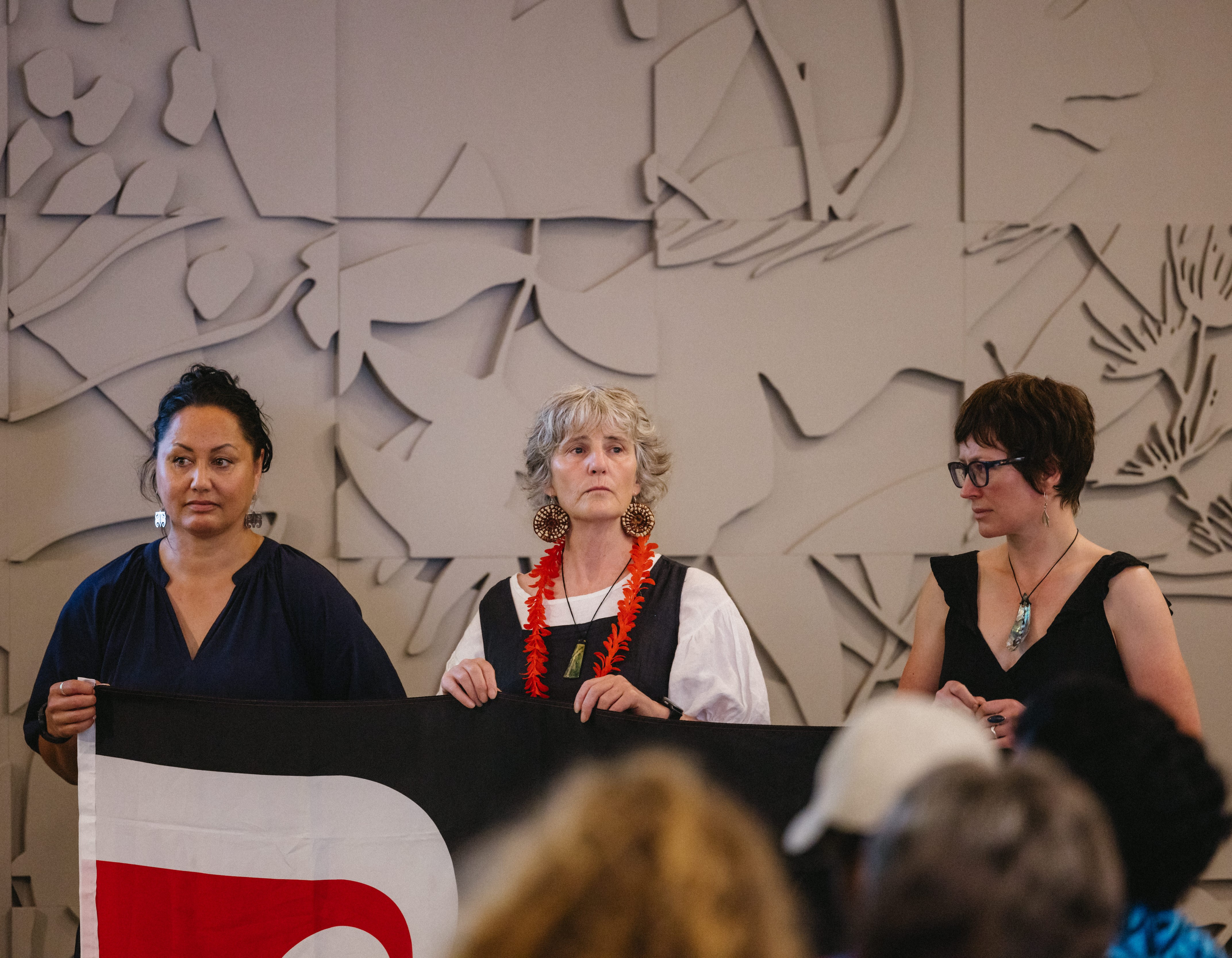
Renee Love
Renee Love, part of the Taiao (environmental) team for Te Ātiawa o te Waka-a-Māui, is actively involved with KMTT (Kotahitanga mō te Taiao Alliance) along with her iwi. They have been instrumental in shaping KMTT’s strategic plan and are rolling out the Kahui Tangaroa project, which will integrate into the Moana Kaitiaki (Sea stewards) strategy. Their focus is on conservation, restoration and the sustainable management of the environment.
The act of weaving, storytelling and sharing traditions with women from different backgrounds was equally powerful for Renee, who stepped into the gathering at the last minute but found it to be a rare and eye-opening experience. It fostered a deep sense of connection for her, reinforcing the idea that Indigenous women, despite coming from diverse places, share common struggles and strengths. However, she was also struck by the stark disparities in environmental rights and protections.
While Māori women from her own community in Aotearoa often hold leadership roles in iwi (tribal) governance and conservation, many of the women she met faced significant barriers—juggling responsibilities while contending with the absence of legal protections and worsening climate impacts. Seeing the disproportionate effects of climate change on communities with fewer resources made her more determined to use her position to advocate for Indigenous women in conservation globally.
In her words . . .
Attending NLW 2024 was a last-minute opportunity for me as I stepped in for Kristie Paki Paki, our Pou Tāiao (Environmental Manager), who had prior commitments. I hadn’t realised events like this existed, especially in conservation, where international opportunities are rare. Knowing I’d be connecting with Indigenous women across the Asia-Pacific made it even more exciting.
Before the gathering, I wasn’t fully aware of The Nature Conservancy’s global reach. Seeing their philanthropic funding and international networks first hand was eye-opening. It reinforced how they support Indigenous communities in conservation, giving them a platform to engage in critical environmental work. Meeting funders and understanding their role in Indigenous conservation efforts helped me see our local efforts within a broader, global context.
A highlight was visiting a conservation site in Queensland where local rangers had reintroduced dingoes. Treated as pests by farmers, these animals helped restore the ecosystem by controlling invasive species, transforming the biodiversity of the area. Seeing Indigenous-led conservation efforts in action was inspiring.
Another memorable moment was the final day’s cultural exchange. We wove together, shared traditions, and found similarities in our languages and customs. Despite coming from different backgrounds, there was a deep sense of connection among us as Indigenous women. The gathering being wāhine-only (women-only) created a safe, supportive space where we could share openly and authentically.
I come from a community where wāhine hold leadership roles in iwi governance and at the marae (complex of buildings where tribes gather) - but many women I met faced significant barriers in their own communities. They juggle careers, motherhood and cultural responsibilities while lacking the legal protections and environmental rights we have in Aotearoa. Climate change is also hitting their communities harder, with rising sea levels and environmental degradation threatening their homes and food sources. It was a stark reminder of how privileged we are in comparison. Since returning home, I’ve felt a deeper sense of gratitude for the resources and rights we have in Aotearoa.
Quote: Renee Love
For anyone considering being part of Nature's Leading Women, I wholeheartedly recommend it. It’s a humbling and inspiring experience, showing the interconnectedness of our work and the strength of Indigenous women in conservation worldwide.
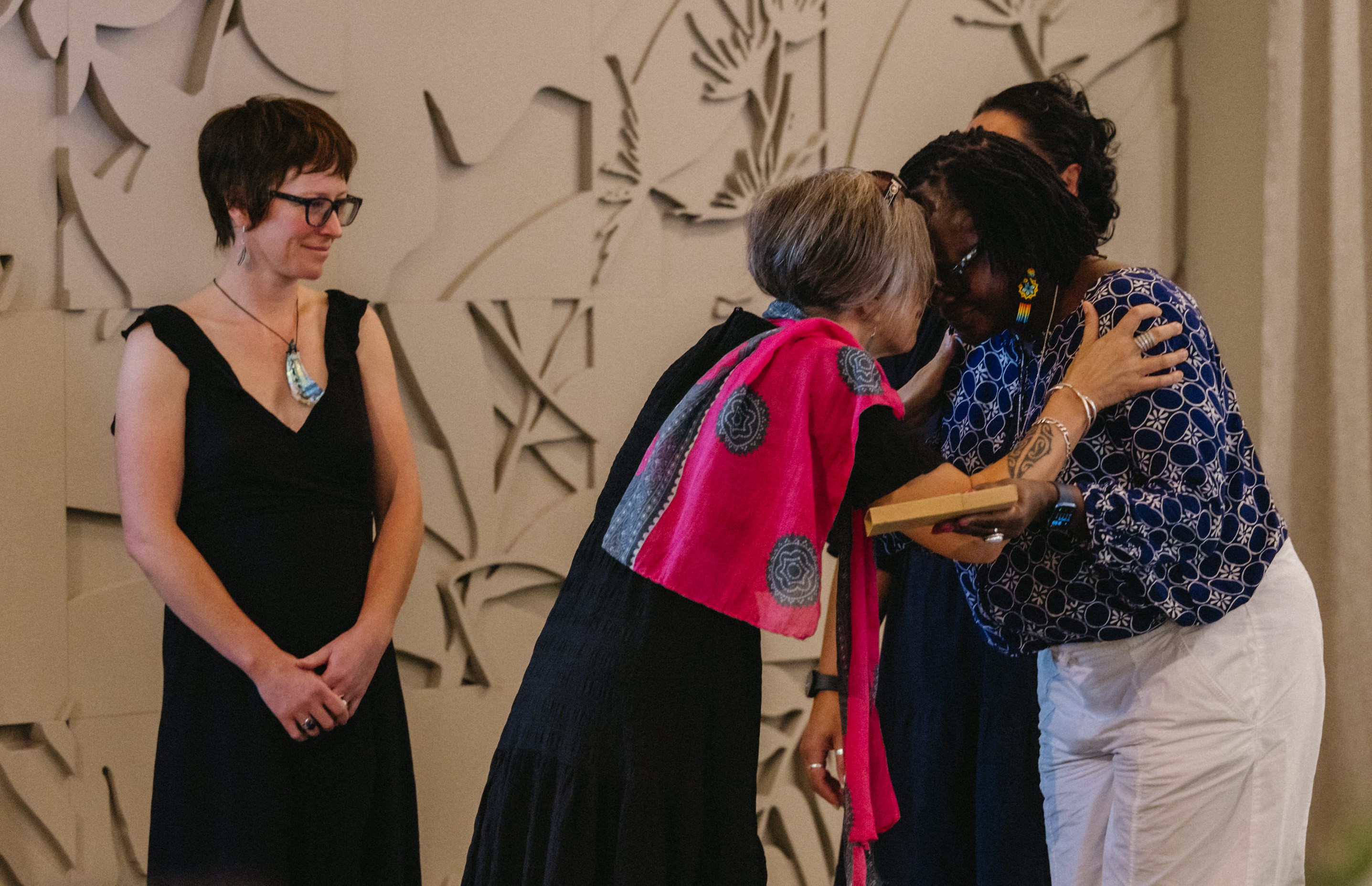
Kura Stafford
Kura Stafford is Project Manager for Ngā Iwi o Te Tauihu Implementing Te Mana o te Wai. Specifically, her role is to support eight Te Tauihu Iwi to build capacity and capability to participate in freshwater management. The purpose of the Project is to ensure Māori values and tikanga (protocol) inform policies and processes to protect, enhance and restore our waterbodies and environment.
Kura found the Nature's Leading Women gathering uplifting despite the gravity of climate challenges. In her view, the shared resilience among women from small island nations, facing climate change’s immediate consequences reinforced the need for solidarity and action.
In her words . . .
The 'Welcome to Country' ceremonies were very special and appreciated. The field trips to the dingo and koala habitat protection initiatives were important and informative. And the visit to the Queensland Art Gallery to see AWA (Artists for Waiapu Action) installation was significant and special.
TNC staff created a safe space for Indigenous women to shine. The most powerful part of the gathering for me was meeting other Indigenous women leading projects and making decisions in their communities to protect and restore their environment and uphold cultural values and practices. We shared similar experiences with our respective work and projects and for positive environmental and cultural outcomes. It was clear that we all had so much to offer, and our voices were crucial to the conversation. It was incredibly valuable to engage with the different experiences shared by women living on the frontlines of climate change impacts, particularly from small island nations.
One of the key things I took away from the gathering was how interconnected Aotearoa and Māori efforts to protect the environment are to other Indigenous communities. The discussions we had about Pacific futures highlighted the need for solidarity and the importance of recognising how much more vulnerable some of our neighbour communities are to environmental degradation and climate change impacts, compared to other countries.
Despite the gravity of the issues, I found the gathering to be an uplifting space filled with innovative ideas and hope. There was a strong emphasis on collaboration and community solutions. There was a focus on the strengths and resilience that communities are showing in the face of adversity. There were so many shared stories of women finding ways to navigate the challenges they face.
I am inspired by women leadership and the role of Aotearoa in the broader Pacific context. It’s made me reflect more deeply on how we can support neighbour island nations in an appropriate and meaningful way and how to raise awareness of their challenges, locally and internationally.
Quote: Kura Stafford
What do we do for those who have been impacted by climate change the most, and how can we stand with them? I hope we take more responsibility in understanding and amplifying their voices in the conversation around climate action.
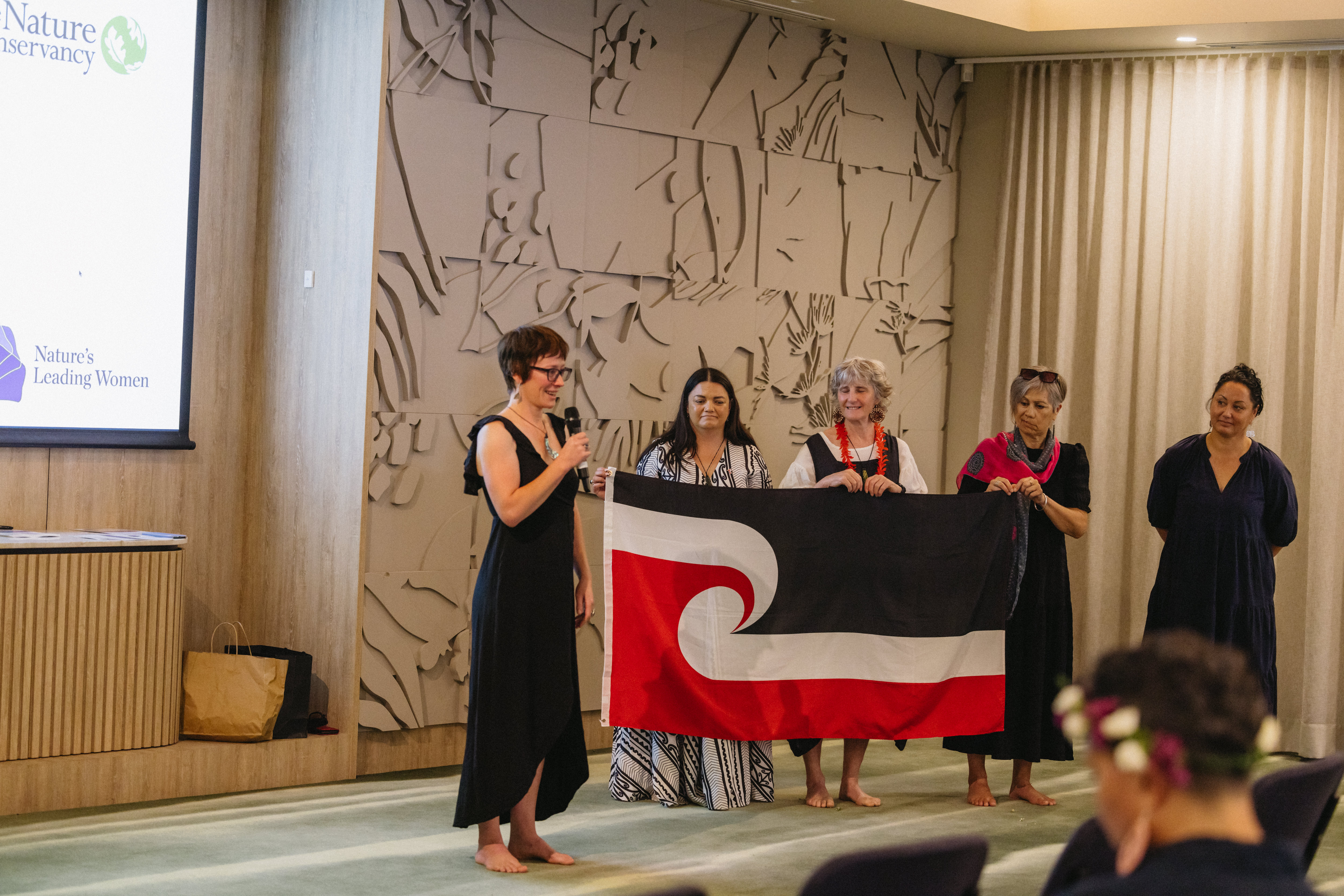
Sacha Healey
For Sacha Healey, a trustee of the Kawatiri Nature Environment and Communities Trust, the most profound lesson was the importance of speaking the language of the community, to ensure that conservation efforts align with local values. The stories of women integrating conservation into religious and patriarchal structures inspired her to think about how similar strategies could apply in Aotearoa, to help a wider audience connect with conservation efforts. Collectively, the women left the gathering energised, inspired, and committed to amplifying Indigenous leadership in conservation.
In her words . . .
Attending NLW 2024 was a transformative experience for me, particularly around the importance of storytelling and speaking the language of the community you’re working in. The gathering emphasised the importance of listening to the communities we aim to serve and making sure they feel ownership of the solutions. Understanding community needs and perspectives ensures that conservation efforts are not only effective but also sustainable in the long term.
One of the most moving aspects was hearing from women in strict religious or patriarchal societies. They shared how they used the language and values of their communities to drive change. It was humbling to see their resilience in overcoming challenges. Their stories taught me that, despite differences in context, the core solutions are often the same. For instance, some women involved male religious leaders in their movements, turning them into champions for their cause. By linking conservation efforts with deeply held beliefs, they achieved a level of commitment that might have been impossible otherwise. This approach made me think about how we can connect our conservation goals with the values of our own community.
Recently, I’ve been working with Clean Streams Karamea, the native plant nursery I helped set up, focusing on fundraising and sustainable business development. Our goal is to make community projects sustainable, ensuring that even when funding decreases, the community feels a sense of ownership and can continue the work. I’m also involved in Kawatiri Nature Environment and Communities Trust (KNECT), which has a project working on localising food production, which is close to my heart because I believe that by feeding ourselves from our own land, we can enact significant change locally and globally.
NLW 2024 gave me the opportunity to connect with women who are deeply committed to food sovereignty and localising food systems. They shared how the act of growing food can empower communities, give them resilience, and help them reclaim autonomy over their lives. It reinforced the idea that food is central to everything—it’s not just about survival; it’s about connection, power, and healing.
Quote: Sacha Healy
If you have the chance to be involved with Nature's Leading Women, I highly recommend it. The support and inclusivity were remarkable. It made the experience even more meaningful, and I left with a renewed sense of purpose and clarity in how to approach my work and make real, lasting change.
We Can’t Save Nature Without You
Sign up to receive monthly conservation news and updates from New Zealand.
